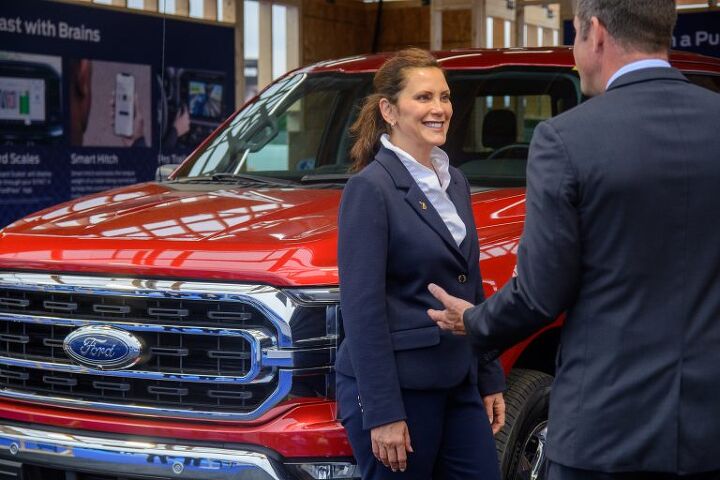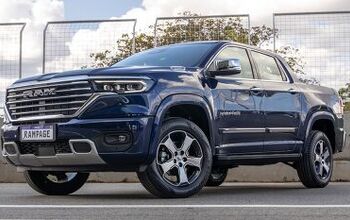Michigan to Build EV Charging Stations for Scenic Drives, Inductive Roads

Michigan Governor Gretchen Whitmer has announced a plan to construct the Lake Michigan Electric Vehicle Circuit that would allow EV drivers to enjoy a scenic, coastal drive without being distracted by fears of range anxiety. Having recently returned from the Mitten state, I can say that its current charging infrastructure is about what you’d expect. You’re bound to find something in the urban hubs, likely with a little help from navigational apps. But the spaces between aren’t going to be of much help and the situation only worsens as you head north along the Eastern coastline where charging points are particularly sparse.
But it’s Lake Michigan that draws the most tourists in a given year, so Whitmer’s team has elected to plot the stations on the Western side of the state to encourage visitors. As a byproduct, leadership said this will also prove that the region is committed to electrification and serious about supporting the evolving automotive industry.
“The circuit is going to entice residents and travelers to explore our incredible coastal communities and amenities while using clean energy, cutting pollution and helping to protect our air and water,” the governor told the the Detroit Regional Chamber’s Mackinac Policy Conference last week, adding that the planned stretch of coastline will be the “best new road trip for electric vehicle owners in America.”
But Whitmer and company aren’t plotting to build anything just yet. According to The Detroit News, the government wants to spend 2021 on a feasibility study aimed at determining whether or not this is a good idea. From there, it’s likely to be a long process of making the right partnerships and going over the logistics of how things should be done.
From The Detroit News:
Grants to install the charging infrastructure will be provided through a Michigan Department of Environment, Great Lakes and Energy program with $1.25 million in funding initially available, according to the governor’s office.
The Wednesday announcement is part of a focus by the Whitmer administration on making the state a leader in electric vehicle manufacturing. The governor also unveiled plans to create academies to help boost the state’s workforce for the jobs that will be created as more customers buy electric cars and trucks.
The state Department of Labor and Economic Opportunity is looking to partner with three to five organizations for the academies, amounting to an investment of up to $5 million, the governor’s office said.
Sounds good in the short term, especially if Michigan ends up being the state that gets more than its fair share of EV-related jobs. But just about every long-term analysis I’ve read suggests that swapping over to EV manufacturing will shrink the automotive sector, resulting in at least 100,000 fewer manufacturing jobs. On the upside, the new jobs created are supposed to offer larger paychecks than what the average line worker can expect today.
Of course, that’s assuming electric cars become the dominant form of transportation in the United States. Despite the past few years representing healthy growth, plug-in vehicles (including hybrids) actually saw their market share go down in 2019. The following year wasn’t much better due to suppressed production stemming from COVID. But it all depends on who you’re asking and how the question is framed. IHS Markit claimed 2020 represented the highest EV acceptance rate in the U.S. in history with a 1.8 percent market share. In the previous year, the Edison Electric Institute also estimated that electrics represented an identical 1.8 percent of the U.S. auto market.
It’s difficult to say who has the most accurate account, especially since the definition of what constitutes an EV remains obnoxiously fluid. Sometimes it means purely battery electric automobiles, sometimes it applies to any plug-in vehicle, and there are even instances where it’s been used as a catch-all for cars utilizing any form of electric propulsion. But manufacturers the world over are still investing heavily into electrification in general, suggesting nobody is interested in abandoning the technology anytime soon.
Gov. Whitmer has also introduced an initiative to develop the nation’s first wireless charging infrastructure on public roads at Motor Bella this month. The plan involves building highways capable of inductive charging, allowing future EVs to recoup lost energy as they continue their journey. Considering most Michigan roads are covered in salt and snow between November and April, I’m not exactly sure how this would work. But she seems excited about the possibility and it would really be something if the state actually managed to pull it off.
“Michigan was home to the first mile of paved road, and now we’re paving the way for the roads of tomorrow with innovative infrastructure that will support the economy and the environment, helping us achieve our goal of carbon neutrality by 2050,” she said. “This project reinforces my commitment to accelerating the deployment of electric vehicle infrastructure in Michigan and will create new opportunities for businesses and high-tech jobs amidst the transition to electric vehicles.”
The Michigan Department of Transportation is supposed to release a Request for Proposal later today “to design, fund, evaluate, iterate, test and implement the Inductive Vehicle Charging Pilot along a one-mile stretch of state-operated roadway in Wayne, Oakland or Macomb counties.”
[Images: Michigan.gov]

A staunch consumer advocate tracking industry trends and regulation. Before joining TTAC, Matt spent a decade working for marketing and research firms based in NYC. Clients included several of the world’s largest automakers, global tire brands, and aftermarket part suppliers. Dissatisfied with the corporate world and resentful of having to wear suits everyday, he pivoted to writing about cars. Since then, that man has become an ardent supporter of the right-to-repair movement, been interviewed on the auto industry by national radio broadcasts, driven more rental cars than anyone ever should, participated in amateur rallying events, and received the requisite minimum training as sanctioned by the SCCA. Handy with a wrench, Matt grew up surrounded by Detroit auto workers and managed to get a pizza delivery job before he was legally eligible. He later found himself driving box trucks through Manhattan, guaranteeing future sympathy for actual truckers. He continues to conduct research pertaining to the automotive sector as an independent contractor and has since moved back to his native Michigan, closer to where the cars are born. A contrarian, Matt claims to prefer understeer — stating that front and all-wheel drive vehicles cater best to his driving style.
More by Matt Posky
Latest Car Reviews
Read moreLatest Product Reviews
Read moreRecent Comments
- FreedMike Um, OK.
- Analoggrotto *What's the most famous track you have driven on while Hyundai foots the bill?
- 2ACL I'm pretty sure you've done at least one tC for UCOTD, Tim. I want to say that you've also done a first-gen xB. . .It's my idea of an urban trucklet, though the 2.4 is a potential oil burner. Would been interested in learning why it was totaled and why someone decided to save it.
- Akear You know I meant stock. Don't type when driving.
- JMII I may just be one person my wife's next vehicle (in 1 or 2 years) will likely be an EV. My brother just got a Tesla Model Y that he describes as a perfectly suitable "appliance". And before lumping us into some category take note I daily drive a 6.2l V8 manual RWD vehicle and my brother's other vehicles are two Porsches, one of which is a dedicated track car. I use the best tool for the job, and for most driving tasks an EV would checks all the boxes. Of course I'm not trying to tow my boat or drive two states away using one because that wouldn't be a good fit for the technology.



































Comments
Join the conversation
"But Whitmer and company aren’t plotting to build anything just yet. According to The Detroit News, the government wants to spend 2021 on a feasibility study aimed at determining whether or not this is a good idea." Newspeak for: We are going to drum up some mindless excuse for taking tax money from productive people, and hand it hand-over-fist to utterly useless deadweight leeches who will produce nothing at all, but instead just sit around having opinions about what other people "should" do, with other people's money. If even that: Most of the loot will ultimately end up with people who do flat out nothing, aside from "owning" the "firms" the "consultants" "work" for. And who collect unearned rent to provide the leeches with fancy downtown offices to sit around and mindlessly do nothing productive in.
"Gov. Whitmer has also introduced an initiative to develop the nation’s first wireless charging infrastructure on public roads at Motor Bella this month. " The exact mechanism for how to most efficiently and reliably enable some form of inflight powering and charging is certainly still up in the air. What it not, is the absolute requirement for such "hot highways" for pure EVs to have even the remotest chance of ever becoming generally viable. Dragging an infinite number of pounds of rare earths around, so that the weight can crush everything driven across and the cost of the steamroller can render most people carless, is so trivially idiotic that even a Michigan politician can recognize it. Without the high draw portion of trips being powered directly by the infrastructure while leaving only last mile to (always topped up) inefficient battery storage, BEVs are, like every other time they have been tried, a complete, and trivially obvious, dead end. The lure of (segregated) hot highways, in addition to reducing local emissions and perhaps soda bubbles (not really but we're all Pretenders now...), is that they as a side effect allows accurate pinpointing of everything on them. Which also renders automatic routing/driving possible. At much higher speeds and densities than if reliant on human driver input. Downsides being, ultimately, security related. I wouldn't want to try keeping the required infrastructure up and running in rural Afghanistan, to put it That way. But barring that, you can make cars awfully weight and space efficient, hence overall efficient consumers of resources, by moving all high speed operation onto "guaranteed safe," fully powered infrastructures. Leaving crash structures, brakes etc. to deal with slow-moving last mile scenarios instead. As well as allowing drivers to spend 90% of their trips doing something other than piloting a car. The potential gains are utterly tremendous, if the security and uptime issues can be dealt with. Enormous enough that they won't be denied for long, now that global populations are so big that efficiency of resource utilization is coming back into relevance again.